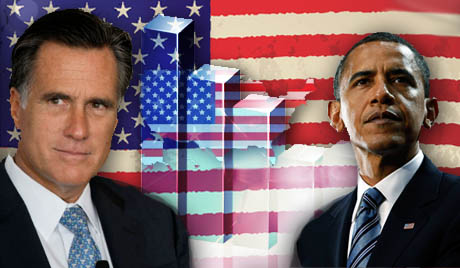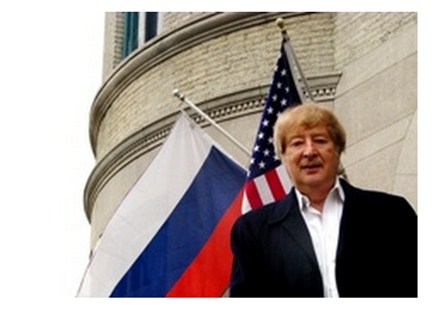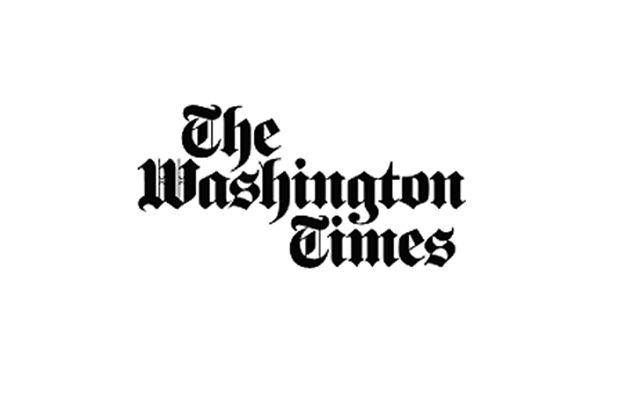
 The US presidential election on 6 November is, arguably, the most important such ballot since the Second World War, given both the deep economic crisis that continues to grip the globe and the international security challenges threatening world stability.
The US presidential election on 6 November is, arguably, the most important such ballot since the Second World War, given both the deep economic crisis that continues to grip the globe and the international security challenges threatening world stability.President Obama entered office at a time when, owing to theeconomic and foreign policies of his predecessor, the federal fiscal deficit and public debt had risen to unprecedented levels in peacetime. While there is encouraging evidence that the economy is rebounding, the recovery will be very fragile: the downside risks are significant, not least thanks to the looming "fiscal cliff” (tax rises and further public expenditure cuts in 2013) as the White House struggles to bring public finances onto a sustainable footing. And early next year, Washington will need to raise once again the limit on public sector borrowing – a difficult political hurdle likely to generate yet more uncertainty. Meanwhile, the US’s largest trade partner – the European Union – is headed for recession or at best will continue to teeter on the brink, while economic growth in China – the US’s third-largest trade partner (after Canada) – is weakening.
The international situation is equally perilous. Chronic instability and terrorism will continue in the Middle East, while the risk of military confrontation between Iran and Israel will almost certainly increase. At the same time, the new US administration will have to oversee the pullout from Afghanistan without leaving that country wholly ungovernable.
Not least, however, Washington will need to focus on the continued geopolitical challenge of a re-emerging China. While this major secular change brings immense all-round benefits, it poses potentially huge risks of minor frictions escalating. The President will need to display a judicious mix of firmness, realism and, on occasion, humility in order to keep relations with China on an even keel.
Finally, US relations with Russia are likely to remain very fraught. The reason for this is that President Putin will in no way relax Russia’s security posture in the face of Western anti-missile defence plans.
- Which of the presidential candidates is better equipped to tackle the challenges of the coming years? Why? On a less serious note, who in your opinion will win?
------------------------
The topic for the Discussion Panel is provided by Vlad Sobell,
Expert Discussion Panel Editor (New York University, Prague)
Expert Panel Contributions

Edward Lozansky,
President, American University in Moscow
Given that the Presidential race is in a dead heat, every vote counts and therefore every responsible citizen should think very hard whom to choose as his/her favorite. The stakes are indeed very high and America definitely needs a strong commander-in-chief who can get us out of this huge economic, financial, and security mess. However, those of us who are DC residents have the dubious privilege of knowing the outcome for our district before the race even begins. As far as I know the Republicans have never been able to win our three electoral votes since March 29, 1961, when Congress ratified the Constitutional Amendment XXIII, which finally gave DC the right to vote in presidential elections. Not even Ronald Reagan, who carried 49 states in 1984 and got 525 out of total 538 electoral votes (the highest number in US history!), was able to perform this miracle.
On a more positive note this takes some pressure off not least our conscience and we can think more pragmatically, leaving emotions aside. So, which US presidential candidate is better able to meet the challenges ahead? There is a traditional question that we should ask. It was first asked by the same Ronald Reagan in 1980, when he campaigned against Jimmy Carter: Are you better off than you were four years ago?
Considering that on domestic affairs the country is equally divided, there is no clear consensus on that and therefore there is no point in listening to candidate’s rhetoric. Both are skilful enough to manipulate the facts and, on top of that, Obama always has a fallback position of blaming everything on Bush.
That leaves us with the foreign policy and security matters. Are we better off than in 2008? George Bush did indeed leave a terrible mess for Obama. The damage done by Bush boggles the mind but was Obama able to undo it or generate some new and, for America, more beneficial foreign policy initiatives? I don’t think so but according to the polls the majority of Americans disagrees and believes that Obama can do a better job in foreign affairs than Romney.
US policy on Russia has little effect on the elections, but in this area there has definitely been some, though I’d stress, limited improvement on the Bush’s era. Therefore, as strange as it may sound, Romney may do a better job in this respect, despite his now famous designation of Russia as the top geopolitical enemy of the United States. Obama, most likely, will continue his sluggish "reset”, which is becoming less and less meaningful. In addition, he will have to constantly prove to the Republican majority in Congress that he is not weak on Russia, not only through rhetoric but also by pursuing some confrontational policies.
Romney, on another hand, is well known for his flip-floppiness. During the last televised debate with Obama, he retracted the word "enemy” (in relation to Russia), replacing it with "adversary”, whatever that means. Moreover, he sent his son Matt to Moscow. Some say that trip was strictly business, raising money (from the archenemy?), had nothing to do with politics, but would you believe that? Indeed, rumor has it that Matt Romney is carrying a secret and more conciliatory message to the Kremlin.
President Putin took notice by stating that "That Mr. Romney considers us to be enemy No. 1 and apparently has bad feelings about Russia is a minus, but the fact that he expresses himself bluntly, openly and clearly means that he is an open and sincere man, which is a plus," And Putin added that "If he is elected president of the US, certainly we will work with him as an elected head of state."
OK, so who is going to win next Tuesday? Some say that it is impossible to predict given the dead heat in the polls; but my former colleague Allan Lichtman from the American University in Washington, who developed a special "13-key” theory about Presidential elections with the Russian mathematician Vladimir Keilis-Borok, believes that he knows the answer.
And the winner is . . . Just read to the end to find out.
Their research shows that Americans choose their president largely according to the performance of the party holding the White House. If the nation fares well during the term of the incumbent party, that party generally wins another four years in office; otherwise, the challenging party prevails.
More precisely, thirteen conditions, or "keys," that gauge the performance of the incumbent hold clues for this year's election's outcome. When five or fewer keys are false, the incumbent party candidate wins. When six or more are false, the other party candidate wins.
• Key 1: Party mandate. After the midterm elections, the incumbent party holds more seats in the U.S. House of Representatives than it did after the previous midterm elections. (False)
• Key 2: Contest. There is no serious contest for the incumbent-party nomination. (True)
• Key 3: Incumbency. The incumbent-party candidate is the sitting president. (True)
• Key 4: Third party. There is no significant third-party or independent campaign. (True)
• Key 5: Short-term economy. The economy is not in recession during the election campaign. (True)
• Key 6: Long-term economy. Real per capita economic growth during the term equals or exceeds mean growth during the previous two terms. (False)
• Key 7: Policy change. The incumbent administration effects major changes in national policy. (True)
• Key 8: Social unrest. There is no sustained social unrest during the term. (True)
• Key 9: Scandal. The administration is untainted by major scandal. (True)
• Key 10: Foreign/military failure. The administration suffers no major failure in foreign or military affairs. (True)
• Key 11: Foreign/military success. The administration achieves a major success in foreign or military affairs. (True)
• Key 12: Incumbent charisma. The incumbent-party candidate is charismatic or a national hero. (False)
• Key 13: Challenger charisma: The challenging-party candidate is not charismatic or a national hero. (True)
Consequently, with only three "false” keys, Obama is the predicted winner this November. Whether this is good for America, the world and US-Russia relations remains to be seen. And, of course, Lichtman and Keilis-Borok could be wrong. After all, scientists sometimes make mistakes too.
 Anatoly Karlin,
Anatoly Karlin,
Da Russophile
When predicting election outcomes, I prefer to listen to those who put their money where their mouths are. As of the time of writing, the Intrade predictions market gives a 66% implied probability of an Obama win. The major betting websites are even more optimistic about Obama’s chances, with most of them giving him implied odds of about 80%. He is even considered more likely than not to win the popular vote, though because of the peculiarities of the US electoral system, it is also quite possible for him to lose the popular vote but still win the Presidency (about a 25% chance of this, according to Intrade). I will now most likely lose the symbolic $10 I placed on a Republican candidate win back in May 2010, when a sharp but unsustainable spike in favor of Obama accruing from Osama bin Laden’s assassination created very good odds for the contrarian gambler. Still, I don’t regret the investment. Always bet against your preferred candidate – that way, you will never be wholly disappointed.
We know that Obama is phlegmatic on the ill-thought out Magnitsky Act, and is likewise lukewarm about missile defense in East-Central Europe – to the extent that he pledged "more flexibility” on this issue to Medvedev in an unfortunate open mic moment that the Republicans later spun for all it was worth. (The Poles seem to have come to terms with this, and are now preparing to spend $4 billion of their own money to modernize their AA systems in the next decade). This is probably driven not so much by a desire to enlist Russia as an ally, as to give the US room to deal with the more pressing issues that will dominate Obama’s second term: The withdrawal from Afghanistan; the military pivot to Asia; a sluggish economy plagued by chronically high budget deficits; the accelerating climate crisis. Another alternative is that Obama’s people take seriously the CIA/Stratfor theory, hinted at by Biden in 2009, that Russia’s "shrinking population base” will nullify it as a Great Power in a couple of decades; hence, it is no longer worth aggressively confronting it as natural trends will doom it to eventual irrelevance anyway. But whatever the true motivations, we can reasonably expect the Reset to survive under a new Obama Presidency.
The GOP position is rather less compromising:
We urge the leaders of their [Russia] to reconsider the path they have been following: suppression of opposition parties, the press, and institutions of civil society; unprovoked invasion of the Republic of Georgia, alignment with tyrants in the Middle East; and bullying their neighbors while protecting the last Stalinist regime in Belarus. The Russian people deserve better, as we look to their full participation in the ranks of modern democracies.
Needless to say, the only part of "the Russian people” who would look on these urgings with sympathy are the small gaggle of pro-Western liberals like Lilia Shevtsova (who brought this to my attention). They slavishly side with America against their own country on every issue they disagree on, so long as it helps undermine Putin. While she is right that such policies would "send a strong signal of support to Russian liberals that America does care about the values and principles it preaches”, it would also likewise alienate not only the Russian government but ordinary Russians too (41% of whom prefer Obama to 8% for Romney in a recent Levada poll). Coupled with his equally confrontational attitudes to China, and the aggressive neocon foreign policy advisors he has surrounded himself with, Romney would appear to be dead-set on provoking into existence that nightmare of Cold War planners – a Russian-Chinese alliance. This would be first and foremost a disaster for America itself.
Then again, as many have already pointed out, Romney is a flip-flopper, and his bellicose rhetoric may well dissipate should he somehow find himself in the White House. Though Romney might describe Russia as America’s "number one geopolitical foe”, that did not prevent his son Matt from recently flying to the evil empire to promote his real-estate company and purportedly assure influential Kremlin advisors that his dad does want good relations between their two countries. If money and the practical exigencies of Presidential office trump his campaign rhetoric, there is good reason to hope that the Reset can survive even under a Romney Presidency.
 Irina Bubnova
Irina Bubnova
American University in Moscow
Conventional wisdom has it that it doesn’t really matter who wins the 6 November presidential election in the US. And given the current international situation and the state of US-Russia relations, it is clear that the United States and Russia will never agree on the most divisive issues, such as missile defense or Syria. Nevertheless, I think that Barack Obama would be better for Russia and the world than Mitt Romney.
Needless to say, the Republicans generally never miss an opportunity to criticize Russia. But in the midst of the election campaign they have used anti-Russian rhetoric as an effective weapon against Obama, whose "reset” policy has been one of the key planks of the President’s foreign policy. Obama’s (and outgoing President Medvedev’s) lack of caution when discussing "future flexibility” on the missile defenses in Seoul in late March clearly did not help: US media gave ample coverage to Mitt Romney’s comments in the wake of the presidents’ embarrassing "open mic moment”; and, unsurprisingly, the episode provided substance to Romney’s description of Russia as America’s "foe Number 1”.
Indeed, in the eyes of the Republicans that statement amounted virtually to a "betrayal” of US national interests by America’s incumbent president. "Today Russia, not Iran or North Korea, is a geopolitical enemy of the United States. Russia always fights for every cause for the world's worst actors.” Romney promptly told CNN. It is not, therefore, surprising that Romney has based his policy toward Russia on the promise to "reset the reset”.
For his part, President Dmitry Medvedev responded by saying that: "I recommend to all US candidates to the presidency at least two things: first that they use their head and consult their reason when they formulate their positions, and that they check their clocks from time to time – it is now 2012, not the mid-1970s”. Russian Minister of Foreign Affairs Sergei Lavrov followed suit by saying that all these statements are driven by "specific circumstances, specific needs of the political struggle that is going on ahead of the upcoming elections in the United States.”
Russian officials were not alone in criticizing the Republicans. No less a figure than Zbigniew Brzezinski, National Security Advisor to President Carter and a leading American scholar on geopolitics, has sharply criticized Romney and the Republican camp in general. Speaking on CNN in February he commented: "…look at those Republican debates. I must say I literally feel embarrassed as an American when I see those people orate”. It is a telling fact that Brzezinski, who earned himself the reputation as a harsh critic of Putin’s Russia, now stands for a constructive dialogue with Russia in order to address common geopolitical challenges.
On coming to office, President Obama wisely abandoned the radical anti-Russian rhetoric of George Bush Jr. and began to formulate a more rational stance – the policy of all-round cooperation with Russia. He, unlike his political opponents, recognized that cooperation with Russia is in the best geopolitical interests of the US.
So if Romney becomes president, it looks like we will be hearing Cold War rhetoric again. Washington will spare no effort to restore a unipolar world and US global hegemony. But is that what modern geopolitical realities and interests of the US and the rest of the world dictate?
For all its faults, Obama’s "reset” pursues a policy toward Russia that is beneficial for the United States itself. Here are some milestones that have been achieved during Obama’s presidency: a new START treaty, mutually beneficial cooperation in the pacification of Afghanistan (and the struggle against drugs trafficking and terrorism), the establishment of joint positions in regard to nonproliferation of nuclear weapons, Russia's accession to the WTO, and the White House’s support for the lifting of the Jackson-Vanik amendment this year – to name just a few.
It is reasonable to assume that Obama will continue to view US-Russia relations as a partnership of two strong powers based on mutual interests and respect. This would be beneficial not only for Russia and the United States but for the international community as a whole. This doesn't mean that Russia and the US will have no disagreements. But in the final analysis, a constant mutually beneficial dialogue with each other in addressing common global challenges is the most rational path.
 Vlad Ivanenko
Vlad Ivanenko
PhD economics, Ottawa
Thinking about the optimal U.S. strategy brings to mind the words of John the Baptist upon the arrival of Christ: "He must become greater; I must become less."
Whoever takes the reins in the US must be ready to navigate the increasingly more treacherous waters with progressively fewer survival kits. It is difficult to foresee exactly from where the strongest challenge to American supremacy will come. Economically, several Asian countries clustered around China, Germany and certain petroleum-exporting regions, Russia included, may see their global importance growing, but each of these contenders may well experience political turbulence. At the same time, a political revival appears to be taking place in the Middle East but how this part of the world can progress economically is unclear.
But first, it is necessary to ask on what foundations the notion that US supremacy will be challenged rests.
Commentators rightly identify the US’s unsustainable fiscal situation as the main trigger of global economic and political instability. But this in itself is only the consequence of deeper economic disorder. The American economic decline did not start four years ago: the market turmoil of 2008 exposed the simple fact that a free-market economy could not live forever in debt to the rest of world. From 1998 onward the US balance of payments deteriorated progressively. Under such circumstances, the mainstream economic advice in 2008 would have been to let the market sort out the problems through bankruptcies, seizure of assets by foreign creditors, unemployment and fall in real wages.
But this scenario was averted with massive state intervention in the markets. Make no mistake that since then contemporary economic theory has had no sure way of predicting what problems we can expect, not to mention how to handle them. The world is going through one of the greatest social experiments of all time: politicians all over the world are groping forward using the time-honored ‘trial and error’ approach. Is it at all possible to act "strategically” in such circumstances?
Yet palliatives are available if strategic problem-solving is not an option. In this respect, the incumbent President has the upper hand over his Republican rival. His record is of adapting to situations instead of fundamentally changing them, and this approach certainly works in the short term. For example, since there is no solution to the problem of the public deficit on the horizon, we can always increase the ceiling of public debt again and over again. Suppose China gets nervous and does not want to increase its holding of US government securities. Well, why not retaliate by employing regulatory and political tools to forestall Chinese investments in North America and elsewhere? If private investors do not wish to buy additional T-bills, it is always possible to proceed to the next round of "quantitative easing” by the Federal Reserve. Granted, the rate of inflation will increase as the result of US public debt monetization; but as long as the US dollar is the global reserve currency, domestic inflationary taxation will be shared with the world, and this, in turn, provides justification for actions aimed at the weakening of competing currencies such as the Euro. The list of such possible short-term measures goes on and on . . .
In general, avoiding tackling the roots of the problem head on,which I see in the diminished competitiveness of the U.S. economy, amounts to political procrastination; but this approach is optimal under the circumstances. I believe that the average US voter would find Barack Obama better suited to operate in the zugzwang in which the US finds itself at the end of 2012. After all, it may turn out that the rest of world is even less prepared for the challenges ahead and will be weakened even more by the crisis.
On this "optimistic" note, let me finish by refuting the maxim that "economics is a dismal science.”. It suffices to substitute the word "crisis” with the phrase "structural change” and everything is back in order. After all, we all know that it is through "creative destruction” that human progress is achieved. Or maybe not?
 Dale Herspring
Dale Herspring
Kansas State University



_jpg/250px-ElbeDay1945_(NARA_ww2-121).jpg)








